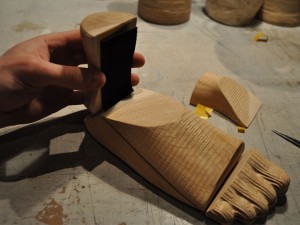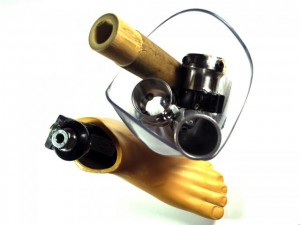
Illustration of low cost prosthesis 1. Copyright, Author: Waag Society/Arne Kuilman 2012, licensed under a cc licence: Naamsvermelding 3.0 Nederland (CC BY 3.0 NL). Source: http://waag.org/en/project/low-cost-prosthesis
Bas van Abel, head of the design lab at waag society, Netherlands had a great session where he spoke about empowering people and fixing our economy by moving to open peer-to-peer production communities. He gave examples of concrete work with miners in Congo, and prosthesis-makers in Indonesia.
Bas starts with a quote from Oscar Wild: “People know the price of everything, but the value of nothing.” He then gets to the argument, that social values are interlinked with economical values: Baas asks us to look at building a relational system, with the core needs of openness and transparency. “We need transparent products, where we know how they were made, and if they were made under fair conditions.”
This may mean to roll back some economic beliefs like division of labour and ‘the invisible hand of a self-regulating markets’. Baas gives the example of mineral extraction in Eastern Congo for cell phone raw materials. See e.g. the documentary ‘blood in the mobile‘.

Illustration of low cost prosthesis 2. Copyright, Author: Waag Society/Arne Kuilman 2012, licensed under a cc licence: Naamsvermelding 3.0 Nederland (CC BY 3.0 NL). Source: http://waag.org/en/project/low-cost-prosthesis
But not all is lost: Unfairness leads to action, says Baas. So he has been creating a ‘fairphone‘ as a community of likeminded people, out of the waag society. They discussed with miners in Congo what would be a fair price for them. My assessment: Not easy. Baas: Reciprocity is important. Baas then sums up: “If you can’t open it, you don’t own it”. A classical open source statement, although he refers back to the makezine’s owners manifesto.
His open design lab wants to empower people by making them understand production and by sharing knowledge on how to design things. Bas: ‘As soon as knowledge about production gets into the hands of peer-to-peer networks of makers, you can produce without industrial conditions and restrictions, and means of production’. He gives example of making of chairs and of, fab-labs. For me, that is bottom up sharing of knowledge on a global level, but producing local solutions.
Blueprints for creators – Some more examples of peer-to-peer production for development:
He first gives the example of cheap wifi transmitters made in fab-lab. Then he presents an interesting project, that Waag is running with fablabs: A low-cost prothesis made with Indonesia to be created by the ones who need them. .
His last point: if you create your own things, that creates real ownership and attachment to the object. Go back to hack technology, be able to repair your own car. He than has a very good summary of this thoughts in a graph, taken from his book ‘opendesignnow‘ (unfortunately, I could not find the graph online …).
Baas ends with Makeme as example for business models around open production. He sees new relationships between makers, co-creators and pro-sumers and a collaborative community. This leads to open sourceeverything (house, cars, cell phones).
Bas: ‘Make the invisible hand visible again. Create value. Opendesignnow!‘
____
Note: This text was first published on the blog of Balthas Seibold at the Alumniportal Germany (www.alumniportal-deutschland.org/en/). Check the blog ( register or login first). All blog entries represent the personal views and ideas of Balthas Seibold.